
Elon Musk, the billionaire entrepreneur known for his outspoken views and business ventures, recently made headlines by cancelling his Netflix subscription. But what prompted this surprising move? Let’s dive into the details.
The Reason Behind the Cancellation
Musk’s decision wasn’t about price or content quality. Instead, it stemmed from his dissatisfaction with the people working at Netflix. According to him, some employees at the streaming giant express ideologies and opinions that he believes “cross the line.” This ideological disagreement motivated Musk to end his subscription as a form of protest.
Ideology vs Entertainment: When Personal Beliefs Impact Viewing Choices
In recent years, Musk has been vocal about his stance on free speech, cancel culture, and political correctness. His Netflix cancellation reflects a broader trend where consumers are reconsidering their subscriptions based on company values, employee behavior, or public controversies.
What This Means for Netflix and Streaming Platforms
Elon Musk’s move could signal a wake-up call for streaming services. As consumers become more conscious of corporate culture and social responsibility, companies might face increased pressure to balance diverse opinions while maintaining a positive work environment.
The Bigger Picture: Celebrity Influence on Consumer Trends
When a high-profile figure like Elon Musk takes a public stance on entertainment choices, it can influence millions of followers. His cancellation might inspire others who share similar views to rethink their subscriptions, impacting the streaming industry at large.
Will Elon Musk Return to Netflix?
For now, Musk seems firm in his decision. Whether this is a permanent break or a temporary statement remains to be seen. As streaming wars intensify with numerous platforms competing for subscribers, customer loyalty is increasingly tied to brand values and culture.
Final Thoughts
Elon Musk’s Netflix cancellation highlights how personal values are becoming intertwined with entertainment consumption. For viewers and companies alike, it’s a reminder that content is not just about what’s on screen—but also about who’s behind it.
Disclaimer:
The views and opinions expressed in this article are those of the author and do not necessarily reflect the official policy or position of any agency, organization, employer, or company. All information provided is for general informational purposes only. While every effort has been made to ensure accuracy, we make no representations or warranties of any kind, express or implied, about the completeness, reliability, or suitability of the information contained herein. Readers are advised to verify facts and seek professional advice where necessary. Any reliance placed on such information is strictly at the reader’s own risk..jpg)




 click and follow Indiaherald WhatsApp channel
click and follow Indiaherald WhatsApp channel